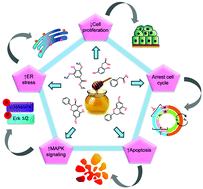当前位置:
X-MOL 学术
›
Food Funct.
›
论文详情
Our official English website, www.x-mol.net, welcomes your
feedback! (Note: you will need to create a separate account there.)
The inhibitory effect of Manuka honey on human colon cancer HCT-116 and LoVo cell growth. Part 1: the suppression of cell proliferation, promotion of apoptosis and arrest of the cell cycle†
Food & Function ( IF 5.1 ) Pub Date : 2018-03-15 00:00:00 , DOI: 10.1039/c8fo00164b Sadia Afrin 1, 2, 3, 4, 5 , Francesca Giampieri 1, 2, 3, 4, 5 , Massimiliano Gasparrini 1, 2, 3, 4, 5 , Tamara Y. Forbes-Hernández 1, 2, 3, 4, 5 , Danila Cianciosi 1, 2, 3, 4, 5 , Patricia Reboredo-Rodriguez 1, 2, 3, 4, 5 , Adolfo Amici 1, 2, 3, 4, 5 , Josè L. Quiles 6, 7, 8, 9, 10 , Maurizio Battino 1, 2, 3, 4, 5
Food & Function ( IF 5.1 ) Pub Date : 2018-03-15 00:00:00 , DOI: 10.1039/c8fo00164b Sadia Afrin 1, 2, 3, 4, 5 , Francesca Giampieri 1, 2, 3, 4, 5 , Massimiliano Gasparrini 1, 2, 3, 4, 5 , Tamara Y. Forbes-Hernández 1, 2, 3, 4, 5 , Danila Cianciosi 1, 2, 3, 4, 5 , Patricia Reboredo-Rodriguez 1, 2, 3, 4, 5 , Adolfo Amici 1, 2, 3, 4, 5 , Josè L. Quiles 6, 7, 8, 9, 10 , Maurizio Battino 1, 2, 3, 4, 5
Affiliation

|
Numerous investigations have been made on plant phenolic compounds and cancer prevention in recent decades. Manuka honey (MH) represents a good source of phenolic compounds such as luteolin, kaempferol, quercetin, gallic acid and syringic acid. The aim of this work was to evaluate the chemopreventive effects of MH on human colon cancer HCT-116 and LoVo cells. Both cells were exposed to different concentrations of MH (0–20 mg mL−1 for HCT-116 cells and 0–50 mg mL−1 for LoVo cells) for 48 h to measure apoptosis and cell cycle arrest as well as apoptosis and cell cycle regulatory gene and protein expression. MH exhibited profound inhibitory effects on cellular growth by reducing the proliferation ability, inducing apoptosis and arresting the cell cycle in a dose-dependent manner. Interestingly, MH treatment in non-malignant cells did not exert any significant toxicity at similar concentrations. The apoptosis event was associated with the increasing expression of p53, cleaved-PARP and caspase-3 and with the activation of both intrinsic (caspase-9) and extrinsic (caspase-8) apoptotic pathways. MH induced cell cycle arrest in the S phase in HCT-116 cells, and simultaneously, in LoVo cells, it occurred in the G2/M phase through the modulation of cell cycle regulator genes (cyclin D1, cyclin E, CDK2, CDK4, p21, p27 and Rb). The expression of p-Akt was suppressed while the expression of p-p38MAPK, p-Erk1/2 and endoplasmic stress markers (ATF6 and XBP1) was increased for apoptosis induction. Overall, these findings indicate that MH could be a promising preventive or curative food therapy for colon cancer.
中文翻译:

麦卢卡蜂蜜对人结肠癌HCT-116和LoVo细胞生长的抑制作用。第1部分:抑制细胞增殖,促进细胞凋亡和阻止细胞周期†
近几十年来,已经对植物酚类化合物和癌症预防进行了许多研究。麦卢卡蜂蜜(MH)代表酚类化合物(如木犀草素,山奈酚,槲皮素,没食子酸和丁香酸)的良好来源。这项工作的目的是评估MH对人结肠癌HCT-116和LoVo细胞的化学预防作用。两个细胞暴露于不同浓度的MH的(0-20毫克毫升-1对HCT-116细胞和0-50毫克毫升-1(对于LoVo细胞而言)48小时,以测量细胞凋亡和细胞周期停滞以及细胞凋亡和细胞周期调控基因和蛋白质表达。MH通过降低增殖能力,诱导凋亡并以剂量依赖的方式阻止细胞周期,从而对细胞生长表现出深远的抑制作用。有趣的是,在非恶性细胞中进行MH处理在相似浓度下没有产生任何明显的毒性。凋亡事件与p53的表达增加,裂解的PARP和caspase-3以及内在(caspase-9)和外在(caspase-8)凋亡途径的激活有关。MH诱导HCT-116细胞的S期细胞周期停滞,同时在LoVo细胞中,它通过调节细胞周期调节基因(cyclin D1,cyclin E,CDK2,CDK4,p21)在G2 / M期发生,p27和Rb)。p-Akt的表达被抑制,而p-p38MAPK,p-Erk1 / 2和内质应激标志物(ATF6和XBP1)的表达增加以诱导凋亡。总体而言,这些发现表明,MH可能是结肠癌的有前途的预防性或治疗性食品疗法。
更新日期:2018-03-15
中文翻译:

麦卢卡蜂蜜对人结肠癌HCT-116和LoVo细胞生长的抑制作用。第1部分:抑制细胞增殖,促进细胞凋亡和阻止细胞周期†
近几十年来,已经对植物酚类化合物和癌症预防进行了许多研究。麦卢卡蜂蜜(MH)代表酚类化合物(如木犀草素,山奈酚,槲皮素,没食子酸和丁香酸)的良好来源。这项工作的目的是评估MH对人结肠癌HCT-116和LoVo细胞的化学预防作用。两个细胞暴露于不同浓度的MH的(0-20毫克毫升-1对HCT-116细胞和0-50毫克毫升-1(对于LoVo细胞而言)48小时,以测量细胞凋亡和细胞周期停滞以及细胞凋亡和细胞周期调控基因和蛋白质表达。MH通过降低增殖能力,诱导凋亡并以剂量依赖的方式阻止细胞周期,从而对细胞生长表现出深远的抑制作用。有趣的是,在非恶性细胞中进行MH处理在相似浓度下没有产生任何明显的毒性。凋亡事件与p53的表达增加,裂解的PARP和caspase-3以及内在(caspase-9)和外在(caspase-8)凋亡途径的激活有关。MH诱导HCT-116细胞的S期细胞周期停滞,同时在LoVo细胞中,它通过调节细胞周期调节基因(cyclin D1,cyclin E,CDK2,CDK4,p21)在G2 / M期发生,p27和Rb)。p-Akt的表达被抑制,而p-p38MAPK,p-Erk1 / 2和内质应激标志物(ATF6和XBP1)的表达增加以诱导凋亡。总体而言,这些发现表明,MH可能是结肠癌的有前途的预防性或治疗性食品疗法。











































 京公网安备 11010802027423号
京公网安备 11010802027423号